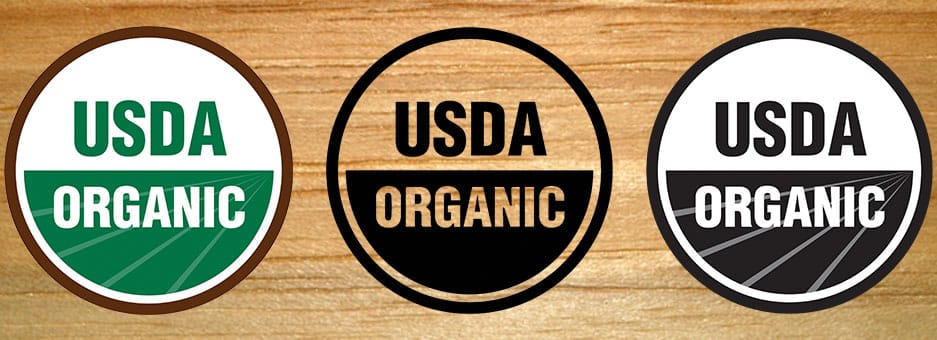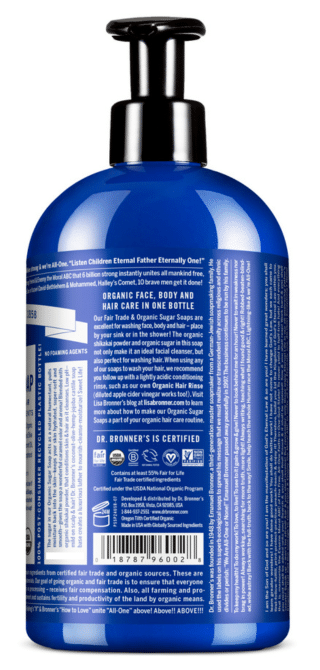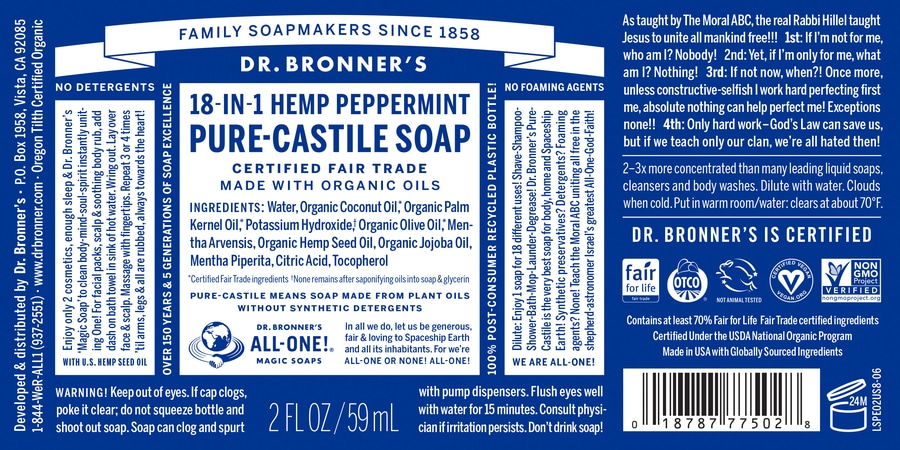When it comes down to it, organic soaps—and Pure-Castile Soaps made with organic ingredients—are better for your skin than conventional soaps and detergents loaded with synthetics and other chemicals that can harm the skin and body. They also tend to have significantly less environmental impact.
Table of Contents
- USDA Definitions on Organic Certifications
- What Ingredients Are Usually Found in Natural, Organic Soaps? Why Are These Better for You?
- Harmful Ingredients Not Found in Organic Soaps and Soaps Made with Organic Ingredients
- Environmental Benefits of Organic Soaps and Castile Soaps
- Economic Benefits of Organic Soaps & Castile Soaps
It’s no secret that eating healthy foods and drinking plenty of purified water is a great way to keep toxins out of our bodies. But the same also applies to what we put on our skin. Research shows that skin, the body’s largest organ, absorbs what we put on it [1]. If our body care routine consists of frequently using soaps, shampoos, and body washes that contain harmful toxins, those will readily be absorbed into the body and can lead to long-term health issues.
Organic soaps, and Pure-Castile soaps made with organic ingredients, are those made with ingredients that occur naturally in nature and are derived from living organisms like plants. These soaps are often referred to as “true soaps” since they are primarily composed of the alkali salts of fatty acids. Other conventional soaps and body washes that dominate most body care aisles tend to contain chemicals that harm the body and planet.
The U.S. Department of Agriculture (USDA) regulates the term “organic” for agricultural products, including cosmetics and personal care items like soap. These products can be labeled in four organic categories:
- 100 percent organic: Contains only organically produced ingredients (excluding water and salt). It can display the USDA Organic Seal and must show the certifying agent’s name and address.
- Organic: Contains at least 95 percent organically produced ingredients (excluding water and salt). The remaining ingredients must be nonagricultural substances or substances not commercially available in organic form, approved on the National List . It can display the USDA Organic Seal and must show the certifying agent’s name and address. For example, our Organic Sugar Soaps are over 95 percent organic and are USDA certified:
Click to enlarge
- Made with organic ingredients: Contains at least 70 percent organic ingredients. The product label can list up to three organic ingredients or “food” groups. It cannot display the USDA Organic Seal but must show the certifying agent’s name and address. Our line of Pure-Castile Liquid & Bar Soaps falls into this category and is designated on the label:
Click to enlarge
- Less than 70 percent organic ingredients: Cannot use the term “organic” on the main label. However, it can identify specific USDA-certified organic ingredients in the ingredients statement. It cannot display the USDA Organic Seal or a certifying agent’s name and address.
What Ingredients Are Usually Found in Natural, Organic Soaps? Why Are These Better for You?
Base and Essential Oils
Most organic soaps and soaps made with organic ingredients contain base oils. A lot of these oils are the same ones we use to cook. Coconut, palm, hemp, and olive oils are common base oils in organic and organically derived soaps. These oils are full of antioxidants and have natural antibacterial properties that are great at:
- Cleansing the skin
- Moisturizing
- Healing/improving skin conditions like eczema, acne, and more
- Preserving youthful qualities
Essential oils are also produced from natural sources and give organic soaps their lively scent. Like base oils, essential oils come from things that are safe to eat, like lemons, lavender, or peppermint. While putting essential oils directly on your skin can cause irritation for some people, it combines perfectly with base oils to cleansing, great-smelling effect.
Glycerin
Glycerin occurs naturally in the process of making soap, known as saponification. Glycerin, a humectant, is one of the best natural moisturizers and works by attracting moisture into the skin. Glycerin has been found to alleviate and prevent skin diseases [2], and strengthen and improve skin texture. Organic soapmakers tend to leave glycerin in the finished product, whereas larger, conventional soapmakers tend to take it out. Why is taken out? One reason is to extend the shelf life of their products, and another is that the extracted glycerin is used for other body care products to save on cost.
Harmful Ingredients Not Found in Organic Soaps and Soaps Made with Organic Ingredients
So what exactly are the bad ingredients frequently found in big-name soaps, shampoos, and body washes? While it’s a long list, the frequent offenders tend to be petrochemical synthetics, preservatives, parabens, phthalates, and generally anything artificially added.
Petrochemical Synthetics
Petrochemical synthetics come from crude oils sources and have a long history of being linked to cancers [3].
Preservatives & Parabens
Parabens and other preservatives are used to increase the shelf life of soaps. At this point, it’s well-documented that they have detrimental effects on the endocrine system which regulates hormones. Many researchers have linked parabens and other synthetic preservatives to decreased fertility [4].
Phthalates
Phthalates are frequently found in mass market soaps and body care products. Their main function is to act as a lubricant or connecting agent to other substances and enhance the fragrance of a product. Like parabens and preservatives, phthalates disrupt the endocrine system and can damage the liver, kidneys, and other systems in the body [5].
Further reading: Avoid These Toxins in Your Everyday Home & Body Care Products
Environmental Benefits of Organic Soaps and Castile Soaps
Because organic and Castile soaps are derived from natural, plant-based ingredients, they can safely go down our drains guilt-free. Conventional soaps, on the other hand, contain a number of pesticides and other harmful chemicals (see above) that adversely affect the water supply, crops, animals, and people. This is because several of the toxins present do not break down in water the way organic ingredients do.
Soaps derived from natural sources are also cruelty-free to animals. No animal testing is performed in their production and Pure-Castile soaps are ones that don’t contain animal fats, only vegetable oils.
In addition, using organic soaps directly benefits your living environment. Because of their natural properties, you, your family, and pets are significantly less likely to suffer allergic reactions from the chemicals found in non-organic soaps.
Economic Benefits of Organic Soaps & Castile Soaps
Have you ever found yourself going from product to product trying to find something that won’t irritate your skin? In reality, conventional soaps and detergents can cause more issues than they solve, and in some cases are causing the problem they claim to solve. Going the natural route can save you money in the long term by cutting out the need to purchase ineffective creams and medicated soaps. They could even save you a trip to your dermatologist.
Many of the organic ingredients we use for our soaps are grown on small farms. Most of the revenue remains in the local community. In our case, our fair trade oils are sourced from farms in Palestine, Sri Lanka, Ghana, and Samoa . These farms receive a fair trade premium and are able to reinvest in their farms and communities.
Going with a natural soap made with organic ingredients is the best choice for your skin, environment, and your pocketbook in the long term. If you haven’t already, we encourage you to try out our vegan, Organic Sugar Soaps and start experiencing the benefits for yourself!
Frequently Asked Questions
What’s the difference between your Organic Sugar Soaps and Pure-Castile Soaps?
Dr. Bronner’s Organic Sugar Soaps are over 95% Organic and are USDA Certified Organic. Dr. Bronner’s Pure-Castile Soaps are made with organic oils and don’t meet the USDA standards of Certified Organic (see more details on these regulations above). Our Pure-Castile Soaps contain over 70% organic ingredients, and so can display the statement “Made with Organic Oils.” Our Sugar Soaps contain organic sugar, which is a natural humectant that moisturizes naturally, and organic shikakai powder that acts as a gentle conditioning cleanser for both the skin and hair.
Do your soaps contain any foaming agents or detergents?
Dr. Bronner’s soaps are Pure-Castile soaps that are 100% genuine. Their rich lather, derived from a high coconut oil content, surpasses any detergent in terms of luxury. With “Pure-Castile,” you can be confident that you’re using an ecologically sound and uncomplicated soap, not a complex detergent blend that contributes to environmental harm through manufacturing waste and slow biodegradability. Regrettably, numerous synthetic detergent blends falsely claim to be “Liquid Soap” despite lacking any genuine soap.


